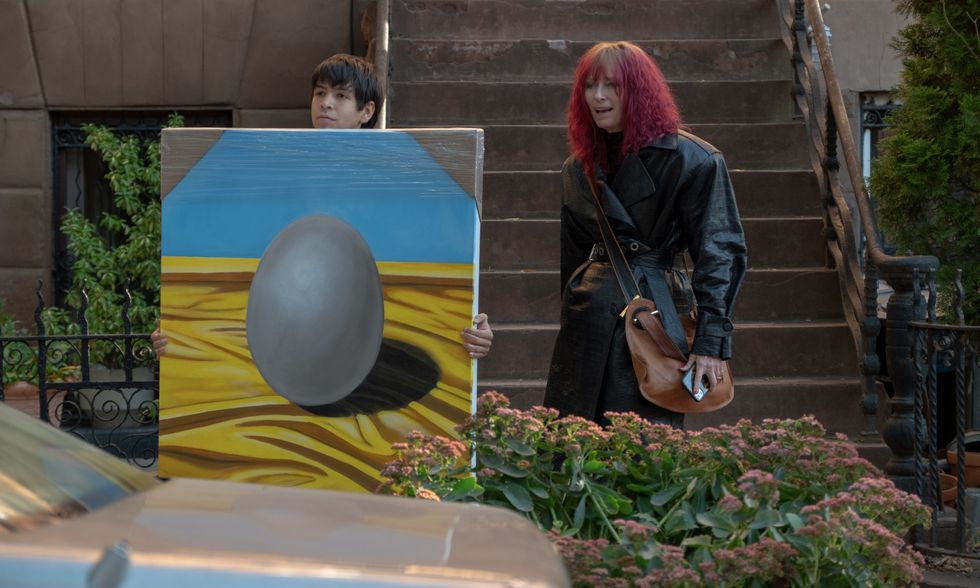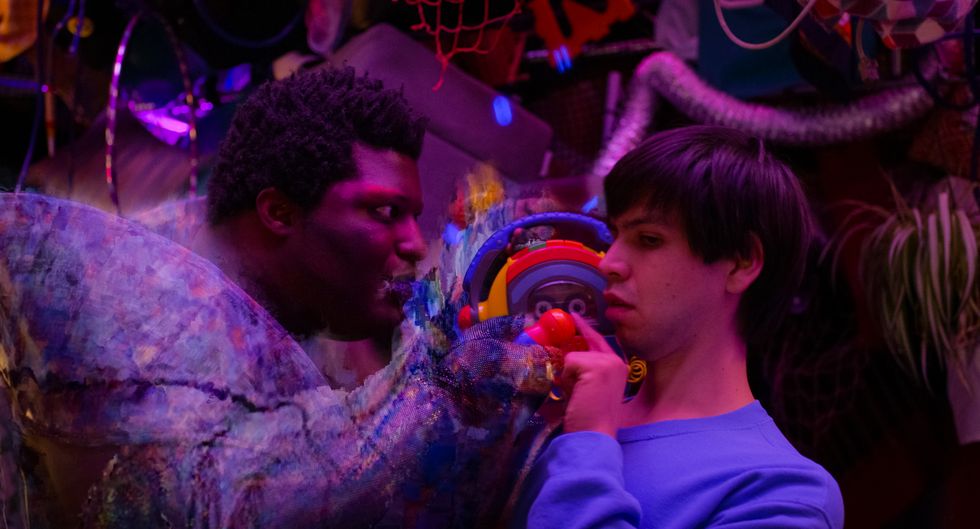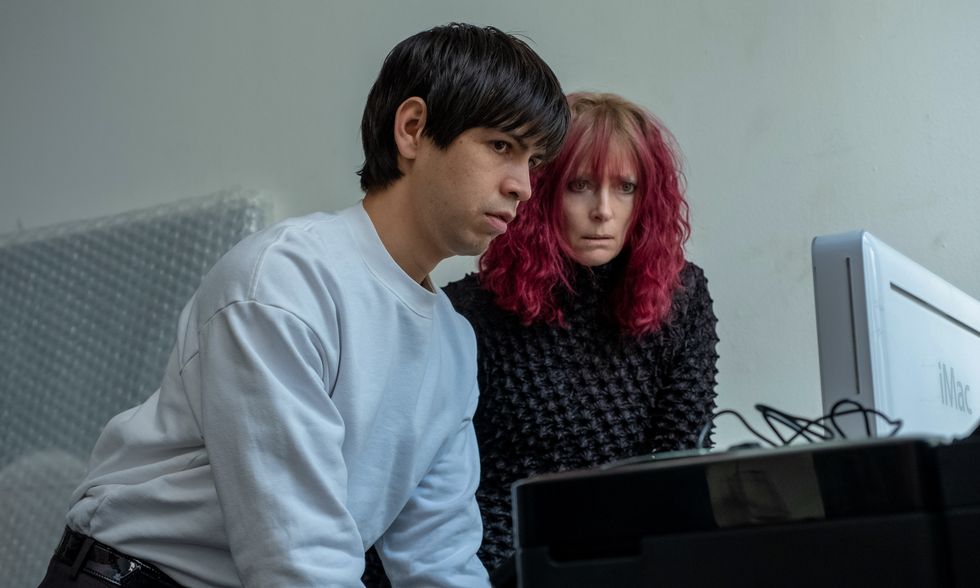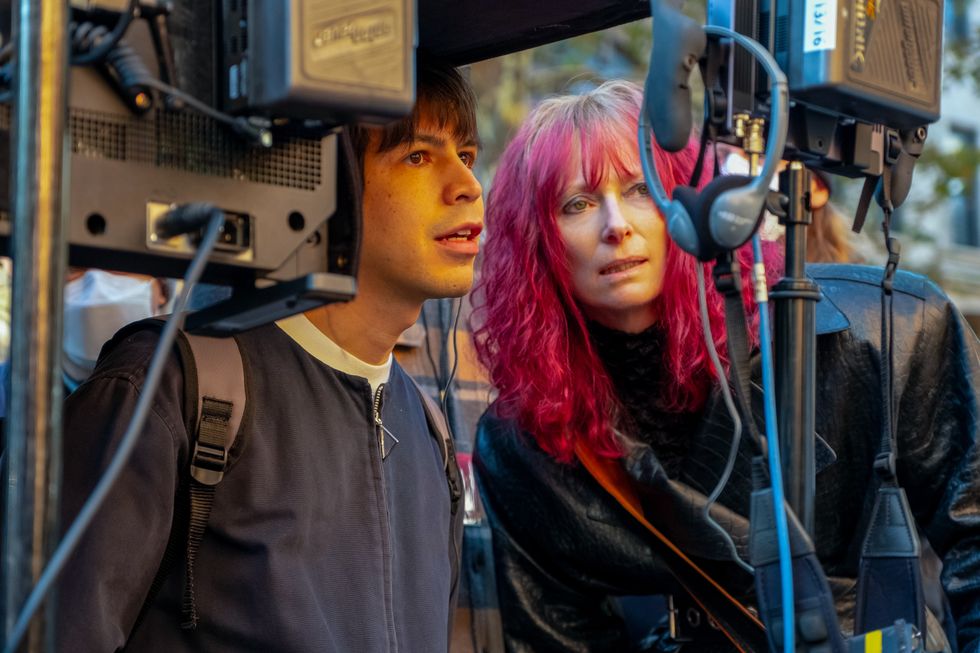
Julio Torres Moves Beyond Cinematic Love
By Tobias Hess
Apr 04, 2024Anyone who has been lucky enough to enter the magnanimous mind of Julio Torres can tell you things are a bit different over there. Over the past decade, the comedian, writer and performer has made a name for himself via his singularly surrealist approach to humor, first as the resident avant-gardist on Saturday Night Live’s writing staff and then as the iconoclastic creative behind HBO’s Los Espookys and My Favorite Shapes, his stand-up special that doubled as an artistic contemplation on, yes, his favorite shapes.
Though Torres has been building his cinematic universe for some time now, no work he’s completed has as clearly expressed his ethos as his new film, Problemista, which he wrote, directed and stars in. The story centers on a young immigrant from El Salvador who works at a cryogenics lab that keeps the deceased frozen under the promise that one day they can be revived. That job connects him with Elizabeth (played by a stellar, terrifying Tilda Swinton), a fearsome arts critic and the widow of an artistic hopeful, Bobby (RZA), whose kitschy paintings of eggs were spurned in his lifetime and whom Alejandro is tasked with tending to in his frozen state. After Alejandro is unceremoniously fired from the lab, he makes a deal with Elizabeth: he will help her retrieve all of her late husband’s egg paintings and curate a show around them, and in return she will sponsor his visa.
It’s clear, early on though, that such a task will be anything but straightforward, as Alejnadro’s journey takes him through the byzantine American immigration system (depicted as a literal maze in the film) and a freakazoid New York filled with ominous characters, such as an imaginary, grimy Craigslist monstress (Larry Owens), and Bingham (James Scully), a gay nepo baby who threatens Alejandro’s perilous position with Elizabeth. Overlaid on this bizarro New York is the ticking clock of Alejandro's immigration status, which is fated to be perilously determined by the whims of Elizabeth, whose pendulum swings between tender and ruthless with the well-meaning young hopeful.
In addition to its irresistible sense of whimsy, the film offers a resonant critique for our time. This is, after all, a film about the US’s disastrous immigration system, which sets people like Alejandro up to fail in their pursuit towards citizenship or residence. “I'm so grateful that the movie has been embraced by the people who are going through similar experiences as Alejandro,” Torres tells PAPER. “I do feel a love and a rally around it, and that's just so humbling and beautiful.”
PAPER chatted with Torres about the joys of working with Tilda Swinton, the process behind the Problemista and where Elizabeth-types may be lurking today.
The film’s release was delayed for a year because of the strike. What was that year like?
It was beautiful. I I had very little to do and I had one of the best summers. And I was very happy that we got to push [the release], because having this movie come out in a compromised way just felt like a disservice to the movie. And then the alternative, of course, felt like a disservice to the strike. So I'm happy it turned out the way that it did. And I think that making movies requires a lot of patience and things move slower than you hope they would, but you just have to learn how to deal with that.
I've been loving reading about your relationship with Tilda. It made me think about all these relationships with older women I’ve had who were a savior for me.
I think part of the reason we hit it off so much is because she operates at the same frequency, or is guided by the same ideas, that so many of my friends are. And it feels like I found someone who I get to commiserate with and work with, and have immense amounts of joy with.. And it just feels very easy and very familiar.
You've added to one of the great Tilda moments in the deep pantheon. Did you have any initial favorite Tilda performances as you were working with her and crafting it?
None that inspired this character specifically. She's always looking for what's new: What haven't I done? I loved her in Orlando. I loved her in The Beach. I loved her in Snowpiercer.
Obviously, Tilda is not like Elizabeth. But did you have Elizabeth's that you've encountered?
A few. That's another queer rite of passage, right? Working for the Elizabeths. She's an amalgam of different people that I've met, men and women, and also there's shades of me in there, especially in how she works with technology.

I feel like, when we encounter people like this, women who might have a certain level of fabulousness and terror, there's a push and pull where queer people may respond to them, like, Oh, they're terrifying but iconic. Did you ever have a kind of scary boss that you also revere?
Not really. I just felt fear. Maybe if I wasn't so close, I would feel like, Okay, werk. [Laughs]
I was so bad at jobs like that. There's nothing more stressful than having a job that relies on you performing really detailed tasks.
Horrible! Because those are the tasks that I’m the worst at. I'm just completely ill-equipped to have those jobs, and it’s a disservice to everyone that I was doing them. There are people who are fantastic planners and who can anticipate a problem. I'm a 1% battery kind of person.
Do you think Elizabeth could only exist in New York City?
It's definitely the right ecosystem for someone like her. I shudder to imagine her with a car. No, I think Elizabeths roam around. I think they travel and migrate. Or they’re in smaller towns like Savannah, Georgia, or Beacon, NY.
I really like the way that the film depicts the art world. There are obviously elements of it that are satirical, but the film is also very sincere in its relationship to art, like the eggs were a very sincere project. How would you describe your relationship to art?
Well, it's all about context, right? The egg paintings can either be an incredible work of art or utter trash depending on who's presenting it to you. That’s something that interests me: who is set up for success, and who isn't? Art is only as valuable as what response it elicits from a person. And the fact that who gets to be an artist is so gatekept feels antithetical to what creating art is supposed to be.
You had some experience yourself working in galleries and in the formal art world, right?
I touched the periphery of it, enough to know what Filemaker Pro is, but I never had a career in the art world. It's definitely not the environment for me. It's too much walking on eggshells and just feeling like you're in trouble the whole time. And there are too many people who haven't ever been told, “No.”

You went to the New School and I went to a similar school, so I am familiar with the types of characters that emerge from those kinds of places. That's why I found the character of Bingham very recognizable. Was that derived from types of characters you spent time around?
Yeah, for sure. There are people where it’s like, “Wait, how does that person have that job? Oh, okay.” Just people who will always land on their feet, or not even land because they're never falling from anywhere. I felt a deep, deep envy for those people, when I was in that period of life.
When Bingham came on the screen, my first thought was: “Oh, love interest.” And that's because the prototypical immigration story in cinema seems to always hinder on love, like, Oh no, you can’t leave the country. You’re in love!
Yeah, Bingham was definitely not the love interest. Bingham was the nemesis, without him knowing. Bingham will not remember Alejandro the next day. Alejandro is not thinking about love. Human beings are too consumed by romance. I think romance just eats up too much of the human experience depicted in film and TV. Like, why is most music about romance? I would write music about bureaucracy.
What would the style be?
I think synthy.
One of the hallmarks of the movie is the surreal way you portray bureaucracy. Do you remember having a sense of this bizarreness when you were going through the throes of US immigration bureaucracy?
It took some time to go back and realize, Oh, wait! That's actually kind of interesting. At the time, it was just all-consuming.
I love the Craigslist character that really evoked the kind of griminess of the internet. Did the internet become a big part of your life during that time?
Craigslist specifically, yeah. It was this wretched well that I kept going back to to see if I could find my next mission.
Did you ever go back to check things out?
I did a couple of times out of curiosity to see how the ecosystem’s holding up. It seems the same.
I remember listening to a Las Culturistas episode you did years ago, where you critiqued when art is called and sold as “important” because it's politically timely. I was wondering how you're navigating that with this film, especially given how migration is discussed in America right now?? How do you balance that critique with this moment?
I shudder at the thought that any real life horrors are a marketing device. I'm made really uncomfortable by that idea. But at the same time I'm so grateful that the movie has been embraced by the people who are going through similar experiences as Alejandro. I do feel a love and a rally around it, and that's just so humbling and beautiful. And I don't take that for granted. But I made something that feels honest to me, and I just hope it connects with people.
How are you thinking about the American dream in the film, and then in your life?
I mean the American dream thing is chapter one of the film. This story is not just a story about someone who has perseverance, but also someone who's questioning the system and criticizing it as you go along. And I think that's important. It's not just about winning the game, but about questioning the game and asking, “Why is this so hard to begin with?” I think that's where [Alejandro] gets into these bigger philosophical questions that aren't just about, like, How do I get there? But like, Why is this road so insanely winding? It's not just about being like, Okay, well, I did it. It's like, Well, it shouldn't have been that hard.

Photos courtesy of A24
From Your Site Articles
- HBO's New Series 'Los Espookys' Is Trailblazing In More Ways Than One ›
- Julio Torres and His Shapes Are Just Barely Holding Up ›
- Julio Torres Is Making His Feature Film Debut With A24 ›
Related Articles Around the Web
MORE ON PAPER
ATF Story
Madison Beer, Her Way
Photography by Davis Bates / Story by Alaska Riley
Photography by Davis Bates / Story by Alaska Riley
16 January
Entertainment
Cynthia Erivo in Full Bloom
Photography by David LaChapelle / Story by Joan Summers / Styling by Jason Bolden / Makeup by Joanna Simkim / Nails by Shea Osei
Photography by David LaChapelle / Story by Joan Summers / Styling by Jason Bolden / Makeup by Joanna Simkim / Nails by Shea Osei
01 December
Entertainment
Rami Malek Is Certifiably Unserious
Story by Joan Summers / Photography by Adam Powell
Story by Joan Summers / Photography by Adam Powell
14 November
Music
Janelle Monáe, HalloQueen
Story by Ivan Guzman / Photography by Pol Kurucz/ Styling by Alexandra Mandelkorn/ Hair by Nikki Nelms/ Makeup by Sasha Glasser/ Nails by Juan Alvear/ Set design by Krystall Schott
Story by Ivan Guzman / Photography by Pol Kurucz/ Styling by Alexandra Mandelkorn/ Hair by Nikki Nelms/ Makeup by Sasha Glasser/ Nails by Juan Alvear/ Set design by Krystall Schott
27 October
Music
You Don’t Move Cardi B
Story by Erica Campbell / Photography by Jora Frantzis / Styling by Kollin Carter/ Hair by Tokyo Stylez/ Makeup by Erika LaPearl/ Nails by Coca Nguyen/ Set design by Allegra Peyton
Story by Erica Campbell / Photography by Jora Frantzis / Styling by Kollin Carter/ Hair by Tokyo Stylez/ Makeup by Erika LaPearl/ Nails by Coca Nguyen/ Set design by Allegra Peyton
14 October




